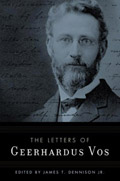
James T. Dennison, Jr., Editor
Reviewed by: John Halsey Wood, Jr.
The Letters of Geerhardus Vos. Edited by JamesT. Dennison, Jr. Published by P&R, 2005. Hardback, 274 pages, list price $29.99. Reviewed by John Halsey Wood, Jr., doctoral student.
We owe a great debt to James Dennison for his work of excavating, publishing, and providing translations of hard-to-find Vos writings. Dennison now brings us a fascinating collection of Vos's correspondence to Abraham Kuyper, Herman Bavinck, Benjamin B. Warfield, and J. Gresham Machen (among others), together with a lengthy introduction. His introduction is thorough, though quirky at places.
Dennison frequently characterizes Vos as a pietist, which should have put him at odds with Kuyper's neo-Calvinism. Yet while Vos's social reclusivity reflected a certain pietism, Dennison's introduction and Vos's letters reveal that Vos shared much with neo-Calvinism. For example, like Kuyper, Vos was a supralapsarian; he employed romantic concepts of idealism, organicity, and historical development; and he deeply appreciated romantic poets. Vos ardently defended confessional Calvinism, as Dennison portrays, although he was more outgoing intellectually than Dennison lets on, as is especially apparent in Vos's romantic tendencies and his appropriation of the insights of the biblical eschatology movement. Nonetheless, Dennison is excellent at leaving no stone of Vos's life unturned.
Reading Vos's mail is entertaining and sometimes surprising. He had a rather low view of the educational systems both in the struggling Dutch college in Grand Rapids and in the renowned nineteenth-century German universities. Vos's letters reveal his early interest in covenant theology and his questions about Abraham Kuyper's view that baptized infants ought to be presumed to be regenerate (Vos himself held to presumptive election).
Dennison's thesis that Vos was a man caught between the Old World and the New World, Amsterdam and Princeton (and Grand Rapids), is an apt characterization of the story told by his letters. They mediated these worlds by facilitating conversations between Kuyper and Herman Bavinck of the Netherlands and Warfield of Princeton. Because he lived simultaneously in different worlds, Vos is not easily pigeonholed. He exemplified the tensions in all three Reformed communities at once.
For example, Vos expressed his concern to Kuyper and Bavinck from Grand Rapids about the Charles Briggs controversy and confessional revision in the Presbyterian Church. He bemoaned the doctrinal and disciplinary laxity of the Presbyterian Church. Yet he also complained about the rigidity of the Dutch pietists who would not tolerate neo-Calvinist developments. Vos criticized Protestant liberalism, yet he feared that fundamentalist premillenialism obscured the gospel.
Vos lamented the extreme pragmatism of American Protestants and the general poverty of the life of the mind. He sought a paradigm for his biblical theology that would exemplify the practical as well as the doctrinal aspects of biblical religion (a paradigm that he found in the biblical covenants). The historic Calvin- ism that Vos stood for was, in his eyes, something other than Protestant liberalism, American fundamentalism, or Dutch pietism. Orthodox Presbyterian readers will surely appreciate Vos's efforts to preserve and develop historic Calvinism amidst the pressures of Protestant liberalism and American fundamentalism.
March 30, 2025
On the Trail with a Missionary
March 23, 2025
Midnight Mercies: Walking with God Through Depression in Motherhood
March 16, 2025
March 09, 2025
Zwingli the Pastor: A Life in Conflict
March 02, 2025
February 23, 2025
African Heroes: Discovering Our Christian Heritage
February 16, 2025
© 2025 The Orthodox Presbyterian Church